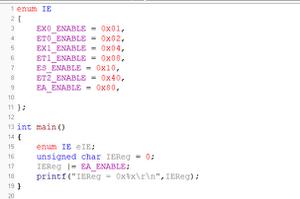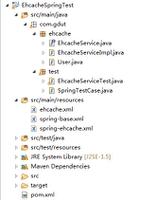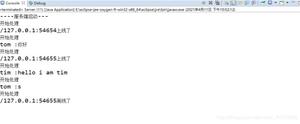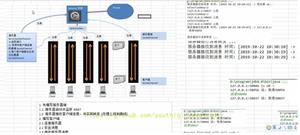Java AIO 异步IO应用实例

项目地址:https://github.com/windwant/windwant-demo/tree/master/io-service
Server:
package org.windwant.io.aio;import java.io.IOException;
import java.net.InetSocketAddress;
import java.nio.ByteBuffer;
import java.nio.channels.AsynchronousChannelGroup;
import java.nio.channels.AsynchronousServerSocketChannel;
import java.nio.channels.AsynchronousSocketChannel;
import java.nio.channels.CompletionHandler;
import java.nio.charset.Charset;
import java.util.concurrent.ExecutionException;
import java.util.concurrent.Executors;
import java.util.concurrent.ThreadLocalRandom;
/**
* AsynchronousServerSocketChannel
*/
public class AIOServer implements Runnable{
private int port = 8889;
private int threadSize = 10;
protected AsynchronousChannelGroup asynchronousChannelGroup;
protected AsynchronousServerSocketChannel serverChannel;
public AIOServer(int port, int threadSize) {
this.port = port;
this.threadSize = threadSize;
init();
}
private void init(){
try {
asynchronousChannelGroup = AsynchronousChannelGroup.withCachedThreadPool(Executors.newCachedThreadPool(), 10);
serverChannel = AsynchronousServerSocketChannel.open(asynchronousChannelGroup);
serverChannel.bind(new InetSocketAddress(port));
System.out.println("listening on port: " + port);
} catch (IOException e) {
e.printStackTrace();
}
}
public void run() {
try{
if(serverChannel == null) return;
serverChannel.accept(this, new CompletionHandler<AsynchronousSocketChannel, AIOServer>() {
final ByteBuffer echoBuffer = ByteBuffer.allocateDirect(1024);
public void completed(AsynchronousSocketChannel result, AIOServer attachment) {
System.out.println("==============================================================");
System.out.println("server process begin ...");
try {
System.out.println("client host: " + result.getRemoteAddress());
echoBuffer.clear();
result.read(echoBuffer).get();
echoBuffer.flip();
System.out.println("received : " + Charset.defaultCharset().decode(echoBuffer));
int random = ThreadLocalRandom.current().nextInt(5);
printProcess(random);
System.out.println("server deal request execute: " + random + "s");
String msg = "server test msg-" + Math.random();
System.out.println("server send data: " + msg);
result.write(ByteBuffer.wrap(msg.getBytes()));
System.out.println("server process end ...");
} catch (IOException e) {
e.printStackTrace();
} catch (InterruptedException e) {
e.printStackTrace();
} catch (ExecutionException e) {
e.printStackTrace();
} finally {
attachment.serverChannel.accept(attachment, this);// 监听新的请求,递归调用。
}
}
public void failed(Throwable exc, AIOServer attachment) {
System.out.println("received failed");
exc.printStackTrace();
attachment.serverChannel.accept(attachment, this);
}
});
System.in.read();
}catch (Exception e){
e.printStackTrace();
}
}
private void printProcess(int s) throws InterruptedException {
String dot = "";
for (int i = 0; i < s; i++) {
Thread.sleep(1000);
dot += ".";
System.out.println(dot);
}
}
public static void main(String[] args) throws IOException {
new Thread(new AIOServer(8989, 19)).start();
}
}
Client:
package org.windwant.aio;import java.io.IOException;
import java.net.InetSocketAddress;
import java.nio.ByteBuffer;
import java.nio.channels.AsynchronousSocketChannel;
import java.nio.channels.CompletionHandler;
/**
* AsynchronousSocketChannel
*/
public class AIOClient implements Runnable{
private AsynchronousSocketChannel client;
private String host;
private int port;
public AIOClient(String host, int port) throws IOException {
this.client = AsynchronousSocketChannel.open();
this.host = host;
this.port = port;
}
public static void main(String[] args) {
try {
new Thread(new AIOClient("127.0.0.1", 8989)).start();
System.in.read();
} catch (IOException e) {
e.printStackTrace();
}
}
public void run() {
client.connect(new InetSocketAddress(host, port), null, new CompletionHandler<Void, Object>() {
public void completed(Void result, Object attachment) {
String msg = "client test msg-" + Math.random();
client.write(ByteBuffer.wrap(msg.getBytes()));
System.out.println("client send data:" + msg);
}
public void failed(Throwable exc, Object attachment) {
System.out.println("client send field...");
}
});
final ByteBuffer byteBuffer = ByteBuffer.allocate(1024);
client.read(byteBuffer, this, new CompletionHandler<Integer, Object>() {
public void completed(Integer result, Object attachment) {
System.out.println(result);
System.out.println("client read data: " + new String(byteBuffer.array()));
}
public void failed(Throwable exc, Object attachment) {
System.out.println("read faield");
}
});
}
}
2017-12-11 改造client: AsynchronousChannelGroup
package org.windwant.io.aio;import java.io.IOException;
import java.net.InetSocketAddress;
import java.nio.ByteBuffer;
import java.nio.channels.AsynchronousChannelGroup;
import java.nio.channels.AsynchronousSocketChannel;
import java.nio.channels.CompletionHandler;
import java.util.concurrent.Executors;
import java.util.concurrent.TimeUnit;
/**
* AsynchronousSocketChannel
*/
public class AIOClient implements Runnable{
private AsynchronousChannelGroup group; //异步通道组 封装处理异步通道的网络IO操作
private String host;
private int port;
public AIOClient(String host, int port) {
this.host = host;
this.port = port;
initGroup();
}
private void initGroup(){
if(group == null) {
try {
group = AsynchronousChannelGroup.withCachedThreadPool(Executors.newFixedThreadPool(5), 5); //使用固定线程池实例化组
} catch (IOException e) {
e.printStackTrace();
}
}
}
private void send(){
try {
//异步流式socket通道 open方法创建 并绑定到组 group
final AsynchronousSocketChannel client = AsynchronousSocketChannel.open(group);
//连接
client.connect(new InetSocketAddress(host, port), null, new CompletionHandler<Void, Object>() {
public void completed(Void result, Object attachment) {
String msg = "client test msg-" + Math.random();
client.write(ByteBuffer.wrap(msg.getBytes()));
System.out.println(Thread.currentThread().getName() + " client send data:" + msg);
final ByteBuffer byteBuffer = ByteBuffer.allocate(1024);
client.read(byteBuffer, this, new CompletionHandler<Integer, Object>() {
public void completed(Integer result, Object attachment) {
System.out.println(Thread.currentThread().getName() + " client read data: " + new String(byteBuffer.array()));
try {
byteBuffer.clear();
if (client != null) client.close();
} catch (IOException e) {
e.printStackTrace();
}
}
public void failed(Throwable exc, Object attachment) {
System.out.println("read faield");
}
});
}
public void failed(Throwable exc, Object attachment) {
System.out.println("client send field...");
}
});
} catch (IOException e) {
e.printStackTrace();
}
}
public void run() {
for (int i = 0; i < 100; i++) {
send();
try {
Thread.sleep(1000);
} catch (InterruptedException e) {
e.printStackTrace();
}
}
}
@Override
protected void finalize() throws Throwable {
super.finalize();
group.awaitTermination(10000, TimeUnit.SECONDS);
}
public static void main(String[] args) {
try {
new Thread(new AIOClient("127.0.0.1", 8989)).start();
System.in.read();
} catch (IOException e) {
e.printStackTrace();
}
}
}
以上是 Java AIO 异步IO应用实例 的全部内容, 来源链接: utcz.com/z/391712.html









